
Languages of Greece
Encyclopedia
The official language of Greece
is Greek
. In addition, a number of non-official, minority languages and some Greek dialects are spoken as well. The most common foreign languages learned by Greeks are English, French, Spanish, Italian, and German.
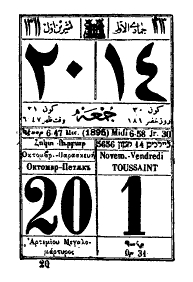
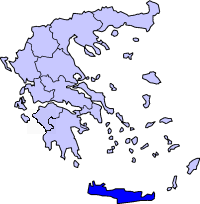
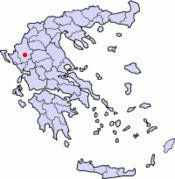
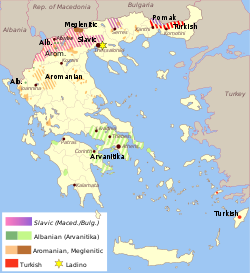
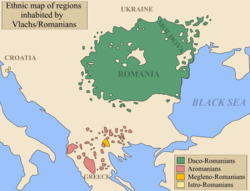 Standard Greek is the only official language of the Hellenic Republic, and is spoken by some 99% of the population (though not necessarily as a first language). Modern Greek
Standard Greek is the only official language of the Hellenic Republic, and is spoken by some 99% of the population (though not necessarily as a first language). Modern Greek
is the officially used standard, but there are several non-official dialects and distinct Hellenic languages
spoken as well.
is a Hellenic language
originally spoken in Cappadocia
and since the 1920s spoken in Greece. It has very few speakers and was previously thought to be extinct.
is spoken by upwards of half a million people on the island of Crete, as well as in the Greek Diaspora
. It is rarely used in written speech, and differs much less from Standard Greek than other varieties.
originally spoken in Pontus
and the Caucasus
, though now mostly spoken in Greece.
is used by some in the Tsakonia
region of Peloponnese
. The language is split into three dialects: Northern, Southern, and Propontis. The language is spoken by only 1,200 people.
, Yevanic
is almost completely extinct today. There are a total of roughly 50 speakers, around 35 of whom now reside in Israel
. The language may still be used by some elderly Romaniotes in Ioannina
.
are a centuries-old local Albanian-speaking community in parts of Greece, especially in the south. Their language, now in danger of extinction, is known as Arvanitika
. They are fully integrated into Greek society and are considered ethnic Greeks, not Albanians. Their number has been estimated to between 30,000 and 140,000.
were a mainly Muslim Albanian group who traditionally lived in Epirus
, in northern Greece. Most of them were expelled during the Second World War. Some have returned after the opening of the Albanian borders.
, also known as Vlachs
, are a population group linguistically related to Romanians. The Aromanian
, an Eastern Romance language, is spoken by the some 40,000 Aromanians in Greece.
dialects heteronomous
with standard Macedonian Slavic
or Bulgarian
are spoken; however, the speakers do not all identify their language with their national identity. The 1951 census recorded 41,017 Slavic-speaking Greek citizens (most of them bilingual
). These Slavic-speakers in Greece vary on how they describe their language - most describe it as Slavic and proclaim a Greek national identity, although there are smaller groups, some of which describe it as Macedonian and espouse an ethnic Macedonian national identity, and some who describe it as Bulgarian and espouse a Bulgarian national identity. Some prefer to identify as dopii and their dialect as dopia which mean local or indigenous in Greek . Ethnologue
estimates 180,000 Slavic speakers, primarily in the Western Macedonia area.
in Western Thrace
according to Ethnologue
, where it is referred to as Pomak
.
in Greece today, some 20,000 speak the language.
is spoken widely. Romani is an Indo-Aryan language similar to many Indian languages, due to the origins of the Roma people in northern India
. The dialect spoken in Greece (as well as in Bulgaria
, Albania
, the former Yugoslav Republic of Macedonia
, Moldova
, Montenegro
, Serbia
, Romania
, parts of Turkey
, and Ukraine
) is known as Balkan Romani
. There are 160,000 Romani speakers in Greece today (90% of the Roma population).
is one of the most widely spoken minority languages in Greece today, with a speaker population of 128,380 people. Traditionally, there were many more Turkish speakers in Greece, due to the long period of rule by the Ottoman Empire, but after the exchange of populations between Greece and Turkey, a much smaller number remain. The Turkish-speaking population of Greece is mainly concentrated in some parts of the regions of Thrace
. Turkish speakers also make up a large part of Greece's Muslim
minority.
, where, at their peak percentage, they made up 56% of the population. However, many of Greece's Jews were murdered in the Second World War, and a large number emigrated to Israel after 1948. It is maintained today by between 2,000 and 8,000 people in Greece.
is a Romance language
spoken in Greece and Macedonia
. There are roughly 2,500 speakers in Greece.
Greece
Greece , officially the Hellenic Republic , and historically Hellas or the Republic of Greece in English, is a country in southeastern Europe....
is Greek
Greek language
Greek is an independent branch of the Indo-European family of languages. Native to the southern Balkans, it has the longest documented history of any Indo-European language, spanning 34 centuries of written records. Its writing system has been the Greek alphabet for the majority of its history;...
. In addition, a number of non-official, minority languages and some Greek dialects are spoken as well. The most common foreign languages learned by Greeks are English, French, Spanish, Italian, and German.
Greek





Modern Greek
Modern Greek refers to the varieties of the Greek language spoken in the modern era. The beginning of the "modern" period of the language is often symbolically assigned to the fall of the Byzantine Empire in 1453, even though that date marks no clear linguistic boundary and many characteristic...
is the officially used standard, but there are several non-official dialects and distinct Hellenic languages
Hellenic languages
Hellenic, as a technical term in historical linguistics, is the branch of the Indo-European language family that includes Greek . According to most traditional classifications, Hellenic contains only Greek as a single language alone in its branch, and is as such co-extensive with "Greek"...
spoken as well.
Cappadocian Greek
Cappadocian GreekCappadocian Greek language
Cappadocian , also known as Cappadocian Greek or Asia Minor Greek, is a mixed language formerly spoken in Cappadocia . In the population exchange between Greece and Turkey in the 1920s, Cappadocian speakers were forced to emigrate to Greece, where they were resettled in various locations,...
is a Hellenic language
Hellenic languages
Hellenic, as a technical term in historical linguistics, is the branch of the Indo-European language family that includes Greek . According to most traditional classifications, Hellenic contains only Greek as a single language alone in its branch, and is as such co-extensive with "Greek"...
originally spoken in Cappadocia
Cappadocia
Cappadocia is a historical region in Central Anatolia, largely in Nevşehir Province.In the time of Herodotus, the Cappadocians were reported as occupying the whole region from Mount Taurus to the vicinity of the Euxine...
and since the 1920s spoken in Greece. It has very few speakers and was previously thought to be extinct.
Cretan dialect
Cretan GreekCretan Greek
Cretan Greek is a dialect of the Greek language, spoken by more than half a million people in Crete and many thousands in the diaspora....
is spoken by upwards of half a million people on the island of Crete, as well as in the Greek Diaspora
Greek diaspora
The Greek diaspora, also known as Hellenic Diaspora or Diaspora of Hellenism, is a term used to refer to the communities of Greek people living outside the traditional Greek homelands, but more commonly in southeast Europe and Asia Minor...
. It is rarely used in written speech, and differs much less from Standard Greek than other varieties.
Pontic Greek
Pontic Greek is a Hellenic languageHellenic languages
Hellenic, as a technical term in historical linguistics, is the branch of the Indo-European language family that includes Greek . According to most traditional classifications, Hellenic contains only Greek as a single language alone in its branch, and is as such co-extensive with "Greek"...
originally spoken in Pontus
Pontus
Pontus or Pontos is a historical Greek designation for a region on the southern coast of the Black Sea, located in modern-day northeastern Turkey. The name was applied to the coastal region in antiquity by the Greeks who colonized the area, and derived from the Greek name of the Black Sea: Πόντος...
and the Caucasus
Caucasus
The Caucasus, also Caucas or Caucasia , is a geopolitical region at the border of Europe and Asia, and situated between the Black and the Caspian sea...
, though now mostly spoken in Greece.
Tsakonian
The little-spoken Tsakonian languageTsakonian language
Tsakonian, Tsaconian, Tzakonian or Tsakonic is a Hellenic language, spoken in the Tsakonian region of the Peloponnese, Greece....
is used by some in the Tsakonia
Tsakonia
Tsakonia or the Tsakonian region describes the area of the eastern Peloponnese where the Tsakonian language is presently spoken...
region of Peloponnese
Peloponnese
The Peloponnese, Peloponnesos or Peloponnesus , is a large peninsula , located in a region of southern Greece, forming the part of the country south of the Gulf of Corinth...
. The language is split into three dialects: Northern, Southern, and Propontis. The language is spoken by only 1,200 people.
Yevanic
A Jewish dialect of Greek spoken by the RomaniotesRomaniotes
The Romaniotes or Romaniots are a Jewish population who have lived in the territory of today's Greece and neighboring areas with large Greek populations for more than 2,000 years. Their languages were Yevanic, a Greek dialect, and Greek. They derived their name from the old name for the people...
, Yevanic
Yevanic language
Yevanic, otherwise known as Judeo-Greek, was the dialect of the Romaniotes, the group of Greek Jews whose existence in Greece is documented since the Hellenistic period. Its linguistic lineage stems from the Hellenistic Koine and includes Hebrew elements as well. It was mutually intelligible with...
is almost completely extinct today. There are a total of roughly 50 speakers, around 35 of whom now reside in Israel
Israel
The State of Israel is a parliamentary republic located in the Middle East, along the eastern shore of the Mediterranean Sea...
. The language may still be used by some elderly Romaniotes in Ioannina
Ioannina
Ioannina , often called Jannena within Greece, is the largest city of Epirus, north-western Greece, with a population of 70,203 . It lies at an elevation of approximately 500 meters above sea level, on the western shore of lake Pamvotis . It is located within the Ioannina municipality, and is the...
.
Albanian
Since the 1990s, large numbers of Albanian immigrants have arrived in Greece, forming the largest immigrant group (443,550 in the 2001 census).Arvanitika
Unlike the recent immigrants from Albania, the ArvanitesArvanites
Arvanites are a population group in Greece who traditionally speak Arvanitika, a dialect of the Albanian language. They settled in Greece during the late Middle Ages and were the dominant population element of some regions of the Peloponnese and Attica until the 19th century...
are a centuries-old local Albanian-speaking community in parts of Greece, especially in the south. Their language, now in danger of extinction, is known as Arvanitika
Arvanitika
Arvanitika also known Arvanitic is the variety of Albanian traditionally spoken by the Arvanites, a population group in Greece...
. They are fully integrated into Greek society and are considered ethnic Greeks, not Albanians. Their number has been estimated to between 30,000 and 140,000.
Cham
The Cham AlbaniansCham Albanians
Cham Albanians, or Chams , are a sub-group of Albanians who originally resided in the coastal region of Epirus in northwestern Greece, an area known among Albanians as Chameria. The Chams have their own peculiar cultural identity, which is a mixture of Albanian and Greek influences as well as many...
were a mainly Muslim Albanian group who traditionally lived in Epirus
Epirus
The name Epirus, from the Greek "Ήπειρος" meaning continent may refer to:-Geographical:* Epirus - a historical and geographical region of the southwestern Balkans, straddling modern Greece and Albania...
, in northern Greece. Most of them were expelled during the Second World War. Some have returned after the opening of the Albanian borders.
Aromanian
The AromaniansAromanians
Aromanians are a Latin people native throughout the southern Balkans, especially in northern Greece, Albania, the Republic of Macedonia, Bulgaria, and as an emigrant community in Serbia and Romania . An older term is Macedo-Romanians...
, also known as Vlachs
Vlachs
Vlach is a blanket term covering several modern Latin peoples descending from the Latinised population in Central, Eastern and Southeastern Europe. English variations on the name include: Walla, Wlachs, Wallachs, Vlahs, Olahs or Ulahs...
, are a population group linguistically related to Romanians. The Aromanian
Aromanian language
Aromanian , also known as Macedo-Romanian, Arumanian or Vlach is an Eastern Romance language spoken in Southeastern Europe...
, an Eastern Romance language, is spoken by the some 40,000 Aromanians in Greece.
Macedonian Slavic
In Greece, SlavicSlavic languages
The Slavic languages , a group of closely related languages of the Slavic peoples and a subgroup of Indo-European languages, have speakers in most of Eastern Europe, in much of the Balkans, in parts of Central Europe, and in the northern part of Asia.-Branches:Scholars traditionally divide Slavic...
dialects heteronomous
Heteronomous language
A heteronomous language variety is a nonstandard language variety whose speakers normally use another, autonomous language variety in writing and education. In such cases, the heteronomous variety is said to be oriented towards the autonomous one...
with standard Macedonian Slavic
Macedonian language
Macedonian is a South Slavic language spoken as a first language by approximately 2–3 million people principally in the region of Macedonia but also in the Macedonian diaspora...
or Bulgarian
Bulgarian language
Bulgarian is an Indo-European language, a member of the Slavic linguistic group.Bulgarian, along with the closely related Macedonian language, demonstrates several linguistic characteristics that set it apart from all other Slavic languages such as the elimination of case declension, the...
are spoken; however, the speakers do not all identify their language with their national identity. The 1951 census recorded 41,017 Slavic-speaking Greek citizens (most of them bilingual
Multilingualism
Multilingualism is the act of using, or promoting the use of, multiple languages, either by an individual speaker or by a community of speakers. Multilingual speakers outnumber monolingual speakers in the world's population. Multilingualism is becoming a social phenomenon governed by the needs of...
). These Slavic-speakers in Greece vary on how they describe their language - most describe it as Slavic and proclaim a Greek national identity, although there are smaller groups, some of which describe it as Macedonian and espouse an ethnic Macedonian national identity, and some who describe it as Bulgarian and espouse a Bulgarian national identity. Some prefer to identify as dopii and their dialect as dopia which mean local or indigenous in Greek . Ethnologue
Ethnologue
Ethnologue: Languages of the World is a web and print publication of SIL International , a Christian linguistic service organization, which studies lesser-known languages, to provide the speakers with Bibles in their native language and support their efforts in language development.The Ethnologue...
estimates 180,000 Slavic speakers, primarily in the Western Macedonia area.
Bulgarian
In addition to the above, there are an estimated 30,000 native speakers of BulgarianBulgarian language
Bulgarian is an Indo-European language, a member of the Slavic linguistic group.Bulgarian, along with the closely related Macedonian language, demonstrates several linguistic characteristics that set it apart from all other Slavic languages such as the elimination of case declension, the...
in Western Thrace
Western Thrace
Western Thrace or simply Thrace is a geographic and historical region of Greece, located between the Nestos and Evros rivers in the northeast of the country. Together with the regions of Macedonia and Epirus, it is often referred to informally as northern Greece...
according to Ethnologue
Ethnologue
Ethnologue: Languages of the World is a web and print publication of SIL International , a Christian linguistic service organization, which studies lesser-known languages, to provide the speakers with Bibles in their native language and support their efforts in language development.The Ethnologue...
, where it is referred to as Pomak
Pomaks
Pomaks is a term used for a Slavic Muslim population native to some parts of Bulgaria, Turkey, Greece, the Republic of Macedonia, Albania and Kosovo. The Pomaks speak Bulgarian as their native language, also referred to in Greece and Turkey as Pomak language, and some are fluent in Turkish,...
.
Armenian
Of the 35,000 ArmeniansArmenians
Armenian people or Armenians are a nation and ethnic group native to the Armenian Highland.The largest concentration is in Armenia having a nearly-homogeneous population with 97.9% or 3,145,354 being ethnic Armenian....
in Greece today, some 20,000 speak the language.
Romani
In the population of 200,000 to 300,000 Roma, or Gypsy, people in Greece today, the Romani languageRomani language
Romani or Romany, Gypsy or Gipsy is any of several languages of the Romani people. They are Indic, sometimes classified in the "Central" or "Northwestern" zone, and sometimes treated as a branch of their own....
is spoken widely. Romani is an Indo-Aryan language similar to many Indian languages, due to the origins of the Roma people in northern India
India
India , officially the Republic of India , is a country in South Asia. It is the seventh-largest country by geographical area, the second-most populous country with over 1.2 billion people, and the most populous democracy in the world...
. The dialect spoken in Greece (as well as in Bulgaria
Bulgaria
Bulgaria , officially the Republic of Bulgaria , is a parliamentary democracy within a unitary constitutional republic in Southeast Europe. The country borders Romania to the north, Serbia and Macedonia to the west, Greece and Turkey to the south, as well as the Black Sea to the east...
, Albania
Albania
Albania , officially known as the Republic of Albania , is a country in Southeastern Europe, in the Balkans region. It is bordered by Montenegro to the northwest, Kosovo to the northeast, the Republic of Macedonia to the east and Greece to the south and southeast. It has a coast on the Adriatic Sea...
, the former Yugoslav Republic of Macedonia
Republic of Macedonia
Macedonia , officially the Republic of Macedonia , is a country located in the central Balkan peninsula in Southeast Europe. It is one of the successor states of the former Yugoslavia, from which it declared independence in 1991...
, Moldova
Moldova
Moldova , officially the Republic of Moldova is a landlocked state in Eastern Europe, located between Romania to the West and Ukraine to the North, East and South. It declared itself an independent state with the same boundaries as the preceding Moldavian Soviet Socialist Republic in 1991, as part...
, Montenegro
Montenegro
Montenegro Montenegrin: Crna Gora Црна Гора , meaning "Black Mountain") is a country located in Southeastern Europe. It has a coast on the Adriatic Sea to the south-west and is bordered by Croatia to the west, Bosnia and Herzegovina to the northwest, Serbia to the northeast and Albania to the...
, Serbia
Serbia
Serbia , officially the Republic of Serbia , is a landlocked country located at the crossroads of Central and Southeast Europe, covering the southern part of the Carpathian basin and the central part of the Balkans...
, Romania
Romania
Romania is a country located at the crossroads of Central and Southeastern Europe, on the Lower Danube, within and outside the Carpathian arch, bordering on the Black Sea...
, parts of Turkey
Turkey
Turkey , known officially as the Republic of Turkey , is a Eurasian country located in Western Asia and in East Thrace in Southeastern Europe...
, and Ukraine
Ukraine
Ukraine is a country in Eastern Europe. It has an area of 603,628 km², making it the second largest contiguous country on the European continent, after Russia...
) is known as Balkan Romani
Balkan Romani
Balkan Romani is group of dialects of the Romani language spoken in various Balkan countries.-Dialects:The Balkan dialects are split into two main groups, a northern group and a southern group :...
. There are 160,000 Romani speakers in Greece today (90% of the Roma population).
Turkish
TurkishTurkish language
Turkish is a language spoken as a native language by over 83 million people worldwide, making it the most commonly spoken of the Turkic languages. Its speakers are located predominantly in Turkey and Northern Cyprus with smaller groups in Iraq, Greece, Bulgaria, the Republic of Macedonia, Kosovo,...
is one of the most widely spoken minority languages in Greece today, with a speaker population of 128,380 people. Traditionally, there were many more Turkish speakers in Greece, due to the long period of rule by the Ottoman Empire, but after the exchange of populations between Greece and Turkey, a much smaller number remain. The Turkish-speaking population of Greece is mainly concentrated in some parts of the regions of Thrace
Thrace
Thrace is a historical and geographic area in southeast Europe. As a geographical concept, Thrace designates a region bounded by the Balkan Mountains on the north, Rhodope Mountains and the Aegean Sea on the south, and by the Black Sea and the Sea of Marmara on the east...
. Turkish speakers also make up a large part of Greece's Muslim
Islam
Islam . The most common are and . : Arabic pronunciation varies regionally. The first vowel ranges from ~~. The second vowel ranges from ~~~...
minority.
Ladino
Ladino, the Judeo-Spanish language, was traditionally spoken by the Sephardic community in Greece, particularly in the city of ThessalonikiThessaloniki
Thessaloniki , historically also known as Thessalonica, Salonika or Salonica, is the second-largest city in Greece and the capital of the region of Central Macedonia as well as the capital of the Decentralized Administration of Macedonia and Thrace...
, where, at their peak percentage, they made up 56% of the population. However, many of Greece's Jews were murdered in the Second World War, and a large number emigrated to Israel after 1948. It is maintained today by between 2,000 and 8,000 people in Greece.
Megleno-Romanian
Megleno-RomanianMegleno-Romanian language
Megleno-Romanian is a Romance language, similar to Aromanian and Romanian, or a dialect of the Romanian language...
is a Romance language
Romance languages
The Romance languages are a branch of the Indo-European language family, more precisely of the Italic languages subfamily, comprising all the languages that descend from Vulgar Latin, the language of ancient Rome...
spoken in Greece and Macedonia
Republic of Macedonia
Macedonia , officially the Republic of Macedonia , is a country located in the central Balkan peninsula in Southeast Europe. It is one of the successor states of the former Yugoslavia, from which it declared independence in 1991...
. There are roughly 2,500 speakers in Greece.

